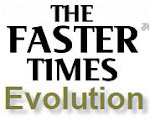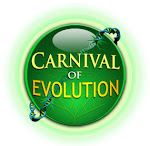A recent blog post at National Public Radio’s Cosmos And Culture by astrophysicist Adam Frank has raised my hackles. The post, titled “The Evolution Debate Is Over; It's Time To Move Forward,” argues that “it's time to put the prejudices that drag down discussion between science and the domains of human spiritual endeavor aside.”
I disagree with Adam Frank and believe that a false impression has caused him to misdiagnose and underestimate a serious problem; as stated in a recent psychology publication (cited below):
I disagree with Adam Frank and believe that a false impression has caused him to misdiagnose and underestimate a serious problem; as stated in a recent psychology publication (cited below):
“Moreover, academics are largely nonreligious, a pattern anticipated by the negative correlation between education and religiosity. Being exposed to like-minded colleagues, academics may form the false impression that religion is a rather rare and marginal phenomenon.”
Furthermore, let me express that I have doubts as to Adam’s sincerity in this stated endeavor. Most would agree that the best way to “move forward” from a subject is to talk about something else – a different topic altogether. Adam chose a different tactic. He placed religion on even ground with science under the premise that both can “be sources of wisdom” and represent "...the many ways humans encounter the True and the Real." This fallacious pairing of religion and science to me seems more conducive to forming an argument than to dispelling one. That aside, the ‘can’t we all get along’ position is a great sentiment, and makes sense in regards to personal communication, but when it comes determining what is real, and what is true in nature, giving equal standing to relativistic mumbo-jumbo and spiritualism is a nonsensical move for anyone that values what is true.
What is real? What is true?
I am typing this piece from the comfort of my couch in Tallahassee, Florida. To type and transmit the text of the post, I’m using a manufactured conglomerate of silicon and plastic that is more commonly referred to as a “laptop computer.” Rather than detailing what precisely a laptop computer is, I am going to assume that the readers of this article are familiar with the technology. Of course, this is a big assumption…
If, for example, you happen to be reading this as a recently arrived member of a primitive tribe from the Amazon Basin or some remote island in Indonesia, a ‘computer’ may be a foreign notion; as would the internet, electricity and many other miracles that I treat as commonplace. In fact, due to its relative rarity in your homeland, your native tongue may not even have the words to describe the luminous rock at which I now peck. Taking it a bit further, the laptop’s ability to conjure light in the absence of fire might even earn it a descriptor with a magical or spiritual connotation! However, regardless if you consider my laptop to be magical or mundane, its nature remains unaltered by our differing languages. It is real - it exists independently of our individual perceptions and doesn’t require faith. It can be held in your hands, measured, weighed and contemplated. The laptop maintains the same physical attributes rather it is in my living room, or it’s placed at a Dani village in New Guinea for use as a backlit fish-cleaning station and object of worship. A laptop is a laptop, is a laptop; thinking that it’s anything other than a laptop is factually incorrect and an artifact of ignorance or self-deception. Believing a laptop to be magic is not insightful, “deep” or quant, quite the opposite - it is something to be remedied through education.
From a philosophical view, does science prove that my laptop is real or that it truly exists? No, science has never, nor will it ever, ‘prove’ anything. After all, it is possible that my laptop is only a figment of my imagination (just as it’s possible that it has magic); but, just because anything is possible, it doesn’t follow that everything is equally likely. There is an ‘objective reality.’ Individual phenomena are labeled as true or un-true based on that objective reality as measured by observation, rationality, discourse and methodical inquiry – reality is measured by science.
Science isn’t in the business of determining certainty; instead it applies a probability based on all available evidence. For example, it is not absolutely certain that humans reproduce through sexual congress. But, based on independent experimentation the stork hypothesis seems unviable, and sex appears to be a statistically significant contributing factor to human pregnancy; thus, sexual reproduction is considered a fact by medical professionals around the world.
In strong contrast to science, religion places subjectivity above objectivity, it requires no evidence, and need not be measurable or even rational. Religion affirms that what may be true for one person need not be true for another. Faith is belief in the absence of, or despite of, evidence. Its tenets are as variable as the range of human personality. With religion all things are possible - even human pregnancy without sex.
Superstitious beliefs are used to affront more than just science education. They’re also used daily as justification for sexism, domestic abuse, racism, killing children, terrorism and numerous other immoral behaviors the world over. Rationalizing these behaviors as different ways of experiencing reality or as acceptable consequences of cultural relativism is just as fallacious as staging a debate between legitimate biologists and creationists – it just serves to validate ignorance.
In closing, let me contrast my perspective from that of Mr. Frank one last time. In his post he writes, “it is clear that at this particular moment in history, when we face such obvious and overwhelming dangers, it's time to put the prejudices that drag down discussion between science and the domains of human spiritual endeavor aside.”
Because I fully agree that there are “overwhelming dangers” in the world, I would declare that the very worst thing we could do would be to offer safe heaven (or, safe haven) to ignorance, superstition and irrationality. Our best hope to prevail over danger is to aggressively combat ignorance with the greatest prejudice we can muster. We should strive to eliminate ignorance from every political office and every schoolhouse. There are some things that should not be tolerated or compromsed.
Sedikides, C. (2009). Why Does Religiosity Persist? Personality and Social Psychology Review, 14 (1), 3-6 DOI: 10.1177/1088868309352323




















...offer safe heaven...
ReplyDeleteA very appropriate typo.
What are you talking about? A typo - where?
ReplyDeleteOoooohhh… wait.
Ummm, right that was aaaa – that was intentional.
I was just…
I was just trying to be clever..?
Good eye. Thanks Chris!
Updated.
Hmm...not sure I entire agree with the quote: "Moreover, academics are largely nonreligious". Most academics I know are religious, and if not they tend to be spiritual, it just doesn't form a problem with their scientific work.
ReplyDeletePeople generally are very good at holding two mildly conflicting ideas in their head. And even an academic surrounded by a full posse of atheist collegues will still be aware of the massive influence of religion in the outside world e.g through husband/family/community.
Another great and provocative post!! First, allow me to point you to The Four Horsemen, a roundtable discussion with four remarkable guys (though I often find Hitchins' politics execrable). The whole 2 hours is available on line (youtube). Have you seen it? Includes Richard Dawkins, Sam and Dennett (names--forget off the top of my head.)
ReplyDeleteI love the notion of the numinous. I call myself a devout agnostic, though, rather than atheist. The reasons are rooted in that notion of the numinous. E.g., how is it possible that I look through these eyes at all? What happens when I die? These are mysteries, marvelous and profound!
However, I believe neither science NOR religion inform the debate meaningfully. In my view, human religions never will--they are myths designed to comfort or persecute, depending on the whims of the member of the species engaged in them.
Science, at least, in its exploration of the mysteries and questions can bring us some deeper insights into all this being business through biology and, yea verily, possibly even deeper physics (how we exist in the context of time and space).
Religion, sadly, when it infects the mind of the researcher, may have deleterious public policy consequences, from denying global warming to the efficacy of needle access programs. Thus, we ignore its pernicious influences at our peril. Would that the funding and conduct of science were unencumbered by the intersections with government, industry and religion!
(Heh--side note: it MIGHT do some good for some clinical trialists, ghost writers and such under the influence of the God of Pharma$$$ to experience the fear of an everlasting hell...)
Lab Rat,
ReplyDeleteI only take issue with “spiritual” when it’s adjoined to religion and/or imposes on reality, or what is ‘true’. To feel awe or connectedness is one thing, to affirm without evidence that such feelings result from the supernatural is another issue entirely.
I went back to the above cited paper and had a look at the quote; it refers to another source (which is available free):
Glaeser, E. L., & Sacerdote, B. I. (2008). Education and religion.
Chicago: University of Chicago Press.
http://wings.buffalo.edu/hced-center/NewFiles/Glaeser.pdf
It’s a monster – 40 pages! I didn’t read the whole thing but from the conclusion:
“At the same time, there is a strong negative connection between attendance and education across religious groups within the U.S. and elsewhere. This can be explained by the fact that education is negatively connected religious belief and there is strong sorting across denominations on the basis of beliefs. We think that the negative correlation between beliefs and education occurs because education teaches a secular belief system that conflict with religious ideology.”
Thanks for the comment!
Thanks GM and welcome back!
ReplyDeleteI’ve seen some clips from the 4-Horsemen, but don’t think I’ve watched the whole thing – I’ll check it out.
I’d fully acknowledge that scientists are as susceptible to influence as any other primate – by religion, money, prestige or otherwise. That is why the process of science strives (and sometimes fails) to filter bias and misguided personal agenda through peer review and similar techniques. However, I’d also assert that even though science is far from a perfect system, it’s the best we’ve come-up with thus far - precisely because its findings can be challenged and shown to be erroneous. Science isn’t all-knowing, but it is self-correcting.
As far as your closing sentiment, in my assessment even the gods of the religious bow to the gods of $$$.
Ahoy there. Great post. One thing that lost me was this:
ReplyDelete"Rationalizing these behaviors as different ways of experiencing reality or as acceptable consequences of cultural relativism is just as fallacious as staging a debate between legitimate biologists and creationists – it just serves to validate ignorance."
I don't agree that they are just as fallacious. That is, I think the former is entirely fallacious... the latter not at all. In fact, debates of just that sort are some of the most interesting to watch and learn from. For instance http://richarddawkins.net/articles/902
Cheers.
Justin,
ReplyDeleteWell… I grasp what you’re saying, and it’s not my goal to split hairs, but the type of person I was referring to when I used the label ‘creationist’ was the type that denies science. Bishop Harries (at your provided link) is not a denier of science – he accepts biological evolution, physics, etc…
Although the above blog post may sound aggressive, it wasn’t my intent to suggest that there shouldn’t be communication with the religious. The point I was trying to make was that it is fallacious for a school board, politician, child or member of the public to be presented with a myth as a debatable alternative to reality and evidence.
Thanks for the comment!
If Evolution is true and we products of randomness where and why did the big bang happen, is this really reality. IF I am merely a product of exploding atoms there is no need for inhibitions and overall decency. Why cant I take what I want and kill when I'm mad. Me and My victims are only atoms which have bonded to form a sentient being by pure chance. If I am only existant as one for my life span there is no need to care about people. They are atoms
ReplyDeleteAnonymous,
ReplyDeleteWow… That’s a heck of a lot of nonsense to squeeze into one comment!
“If Evolution is true and we products of randomness where and why did the big bang happen, is this really reality.”
Firstly, evolution is a non-random process; therefore, we are not products of ‘randomness’ in the biological sense. From a cosmological perspective, looking backwards towards the ‘big bang’ is far from sufficient enough to suggest any meaningful estimate of probability. Though certainly uncountable numbers of chance, stochastic (and in hindsight fortuitous for us) events must have contributed to our presence here today, any other outcome would have been just as likely or unlikely. In other words, your view is from the winner’s circle, and as we all know odds are placed at the beginning of a race, not at its conclusion. Your ego is leading you astray; you are not the center of the universe.
“IF I am merely a product of exploding atoms…”
MERELY a product of exploding atoms!?! I can see that you’re not easily impressed; the atoms in your right-hand are likely forged from a different supernova than those in making-up your left-hand... Merely?
“… there is no need for inhibitions and overall decency. Why can’t I take what I want and kill when I'm mad. Me and My victims are only atoms which have bonded to form a sentient being by pure chance. If I am only existent as one for my life span there is no need to care about people. They are atoms”
Your behavior is dictated more by your upbringing and whatever culture you happen to find yourself in than by your atomic latticework. Unless of course you happen to be subject to some sort of neurological imbalance or something, in which case bad chemistry or an abnormal physiology might be affecting your social interactions. So, assuming normal biological processes, if you happen to be surrounded by people that believe it’s justified to murder a spouse for having an affair, than you may hold the same view. The biological capacity to acquire and maintain cultural teachings and to ‘feel’ compassion, trust, and the like is a product of evolution - likely brought about through some combination of reciprocal altruism and kin selection. At any rate, if your behaviors happen to fall outside of what your society finds acceptable, it will be your peers that make you an outcast or send you to prison – that’s the reality!
Thanks for the comment!
Unfortunately if I am from the bing bang according to you I am literally from the center of the universe. But can you explain to me why I should care about what you think if you are simply a product of an explosion, Im not trying to change your veiw just get an answer, you are so small and insignificant, as am I, if evolution/bing bang theory is true WHY SHOULD I CARE, if "human decency" is just the product of favorable selection to form stronger bonds to ssurvive and I no longer need them to LIVe why conform
ReplyDeleteAnonymous,
ReplyDeleteWell, if your measure of human worth is the quantity of matter that our bodies contribute to the universe, than I fully agree - we are all insignificant, and our lives are inconsequential. But, I’m quite sure that isn’t how you value yourself or others!
Instead you probably place value in non-random LIFE, complete with all of its emergent properties; the ability to see the surrounding landscape, to taste delicious food, to hear music, and in the case of humans to contemplate it all through a conscious perspective. We all have purpose; even better, we can choose that purpose for ourselves. And that is exactly why you should care. Treating others in a ‘decent’ way has promoted cohabitation and cooperation, which has in turn lead to family groups and societal organization. Organized as a society we have greater flexibility to move beyond pure survival. Because of the relationships you hold with family, friends, grocers, doctors, construction workers, police officers, and the rest of society, you can give-up hunting and gathering and pursue YOUR PURPOSE while enjoying all of the physical and emotional pleasures (from ‘feeling’ loved to ‘tasting’ ice-cream) provided by the neurotransmitters of your physical form. The price for the indulgence of this group cohesion is the responsibility to lend a hand in maintaining it (i.e. following the rules and contributing).
Yes, the matter that makes-up our bodies may have origins at the center of the universe; but, I think you’d agree that we’ve moved on since then.
Thanks again!
I wonder whether Anonymous thinks about why all atheists aren't out there raping and pillaging, or why atheists are substantially under-represented in the U.S. prison population as compared with Christians. Given his/her strange line of reasoning, we should be among the worst offenders. That we aren't suggests that Anonymous is missing something, but I doubt that he/she will have the intellectual integrity and insight necessary to consider that possibility.
ReplyDelete